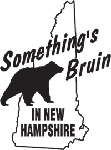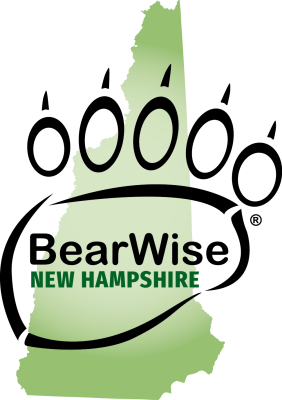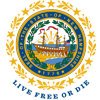Black Bears in New Hampshire
Tips on How to Avoid Human-Bear Conflicts
 Although black bears are generally shy and usually avoid humans, they are opportunistic and will search for human food supplies when natural foods are not available. Maintaining a sustainable bear population in New Hampshire depends on minimizing human-bear conflicts. It is illegal to intentionally feed bears in New Hampshire. Intentional feeding can create problems within residential areas and can result in fines. It also may threaten the life of the bear, if it becomes a nuisance animal as a result of this feeding.
Although black bears are generally shy and usually avoid humans, they are opportunistic and will search for human food supplies when natural foods are not available. Maintaining a sustainable bear population in New Hampshire depends on minimizing human-bear conflicts. It is illegal to intentionally feed bears in New Hampshire. Intentional feeding can create problems within residential areas and can result in fines. It also may threaten the life of the bear, if it becomes a nuisance animal as a result of this feeding.
Take your Birdfeeders Down
At Home and on the Farm
- Take down, clean and put away bird feeders by April 1. Store the bird feeder until late fall. (Birds will do just fine with the natural foods available.) Bear damage to bird feeders is a common and growing spring complaint.
- Clean up spilled seed below feeder stations.
- Keep garbage in airtight containers inside your garage or storage area. Double bagging and the use of ammonia will reduce odors that attract bears.
- Garbage for pickup should be put outside the morning of collection and not the night before.
- Do not place meat or sweet food scraps in your compost pile.
- Do not leave pet food or dishes outdoors at night.
- Clean up and/or store outdoor grills after use.
- Use a bear-proof dumpster.
- Never intentionally feed bears to attract them to your yard for viewing. It is illegal to intentionally feed bears.
Camping Prevention
- Maintain a clean campsite.
- Put food scraps and fat drippings in closed containers, not in the campfire.
- Do not cook or eat in your tent.
- Keep food and cooking gear separate from your sleeping area.
- Keep food in a closed-up vehicle or hang food at least 10 feet off the ground and five feet out on a limb that will not support a bear.
A fed bear is a dead bear!
When black bears are fed, they quickly learn unbearlike behaviors. Sadly, this may lead to serious, often deadly, results for the bear. You can prevent this by following the simple guidelines above.
Don't Feed the Habit
As snow disappears in the early spring hungry bears leave their winter dens. Early spring offers the promise of abundant bear foods, but yields no such benefit until grasses grow, bulbs sprout and flowers bloom. Hungry bears lack the option to wait for spring growth. Although bears are generally shy and usually avoid humans, their need for food and their fondness for sunflower seeds often draw them to New Hampshire bird feeders.
Here are some suggestions to prevent your bird feeder from becoming a bear feeder:
- Complete your bird feeding activities by April 1 each year. Don't feed the birds until late fall (the birds will do just fine).
- Bears are clever. This, coupled with their strength and agility, make it very difficult to establish bearproof bird feeders.
- Purposeful feeding can result in the bears getting accustomed to humans. This "habituation" of bears may cause a variety of conflicts with humans. The end result may be the removal (most often with lethal consequences) of the offending bear.
- Encourage your bird-feeding friends and neighbors to adhere to these guidelines. Be reminded that many people have an irrational fear of bears. A black bear's presence in a residential area may create fear among neighbors and lead to negative consequences for the bear.
Take Proper Care of Your Garbage
Black bears are one of New Hampshire's most magnificent big mammals. Although bears are shy and usually avoid humans, they are also opportunistic and will search for human food supplies when there's little natural food available. Their keen sense of smell can lead them to trouble - both for themselves and humans. Maintaining a sustainable bear population in New Hampshire depends on minimizing human-bear conflicts. Take proper care of your garbage to help avoid these conflicts.
Don't trash our bears
- Keep dumpsters and trash containers secured at night. Lock and bolt both tops and sliding side doors, if necessary Use metal trash cans, including lids.
- Choose adequate sized dumpsters. Don't let dumpster garbage overflow.
- Stabilize smaller dumpsters to prevent bears from tipping them over.
- Rinse out dumpsters with a hose, and deodorize with ammonia if necessary
- Pick up loose or spilled garbage.
- Erect portable electric fences around dumpsters to reduce bear activity, when necessary
- Double-bag garbage and place it in air-tight containers to reduce food odors that may attract bears.
- If you keep garbage in a shed, keep the doors closed tightly to prevent bears from forcing them open. If bears get into sheds, move garbage to a more secure location and leave shed doors open after removing attractants. Deodorize with ammonia as necessary
- Further discourage bears from approaching dumpsters by using loud noise-making devices.
- Never intentionally feed bears to attract them to your yard for viewing. Remember... a fed bear is a dead bear!
What You Should do if you Encounter a Black Bear
- Normal trail noise should alert bears to your presence and prompt them to move without being noticed. However, if you see a bear, keep your distance. Make it aware of your presence by clapping, talking or making other sounds.
- If a bear does not immediately leave after seeing you, the presence or aroma of food may be encouraging it to stay. Remove any sight or smell of foods. Place food items inside a vehicle or building. Occupy a vehicle or building until the bear wanders away.
- Black bears will sometimes "bluff charge" when cornered, threatened or attempting to steal food.
- Stand your ground and slowly back away.
- Enjoy watching black bears and other wildlife from a distance. Respect them and their right to live in wild New Hampshire.
- Black bears do not typically exhibit aggressive behavior, even when confronted. Their first response is to flee. Black bears rarely attack or defend themselves against humans.





